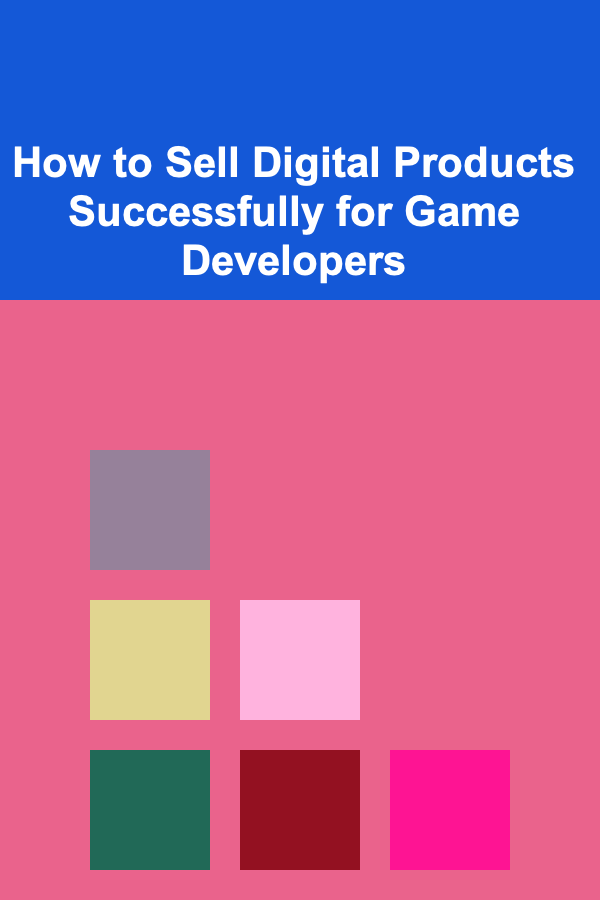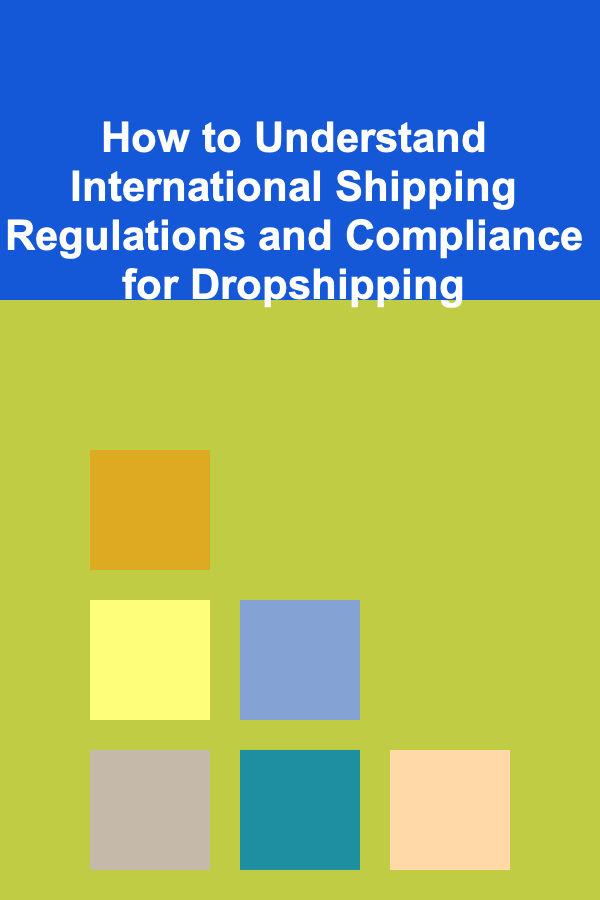
How to Sell Digital Products Successfully for Game Developers
ebook include PDF & Audio bundle (Micro Guide)
$12.99$9.99
Limited Time Offer! Order within the next:

As a game developer, selling digital products can be a great way to monetize your skills and generate revenue. Whether you're selling indie games, assets, game tools, or digital content like art, music, or sound effects, the digital marketplace offers tremendous potential. However, navigating the complexities of digital product sales requires more than just coding and creativity; it demands strategic thinking, marketing efforts, and a deep understanding of your target audience. In this actionable guide, we'll explore the key steps and strategies to sell your digital products successfully.
Identify and Understand Your Niche
Before diving into selling, the first step is to clearly identify and understand your niche. This means having a clear sense of who you are selling to, what their needs are, and how your products meet those needs. Whether you're targeting fellow game developers, gamers, or content creators, each niche has its own preferences, pain points, and purchasing behaviors.
Research Your Audience
- Understand Market Demand: Study what types of digital products are currently in demand. If you are selling game assets (like 3D models or environments), investigate which types are trending in the market.
- Analyze Competitors: Look at other successful game developers or digital product creators in your niche. What are they offering? How do they price their products? What marketing tactics are they using? Learning from their strategies can help you position your product more effectively.
- Know Your Ideal Customer: Identify the characteristics of your target customer. Are they indie game developers looking for low-cost, customizable assets? Are they hobbyist gamers interested in small indie games? Knowing this will guide your product development and marketing efforts.
Tailor Your Product to Their Needs
Once you know your audience, make sure your product is tailored to solve their specific problems. Whether you're creating a game tool, an asset pack, or an entire game, ensure that the value your product offers aligns with what your audience wants.
Create High-Quality and Unique Digital Products
The foundation of successful digital product sales is creating a high-quality product that stands out from the crowd. High-quality doesn't necessarily mean high-budget; it's about creating something functional, polished, and valuable to your target market.
Focus on Quality and Usability
- Test Your Product: If you're creating a game asset or tool, ensure that it is bug-free, easy to use, and compatible with common platforms (e.g., Unity, Unreal Engine). If it's a game, make sure it's polished, with engaging mechanics, and well-designed visuals.
- Make It Unique: Standing out in a crowded market can be challenging. Make sure your product offers something unique that competitors don't provide. This could be a unique art style, innovative gameplay mechanics, or an efficient game development tool that saves time for other developers.
Create a Portfolio of Products
If you're a game developer who creates assets, consider developing a diverse range of products that can appeal to different segments of the market. For instance, you could sell environment packs, character models, sound effects, or entire level templates.
Choose the Right Platform for Selling
When it comes to selling digital products, the platform you choose is crucial. The platform you use will determine the ease of transaction, the reach of your product, and the overall user experience.
Marketplaces for Indie Games
- Steam: One of the most popular digital storefronts for indie game developers. Steam offers a wide reach but can be competitive. Getting your game onto Steam requires submission through Steam Direct, which includes a fee.
- Itch.io : A popular platform for indie game developers that gives you a lot of control over pricing, bundles, and promotional campaigns. Itch.io also allows for a more flexible business model, including pay-what-you-want pricing.
- GOG: A platform focused on DRM-free games. While GOG's audience is smaller than Steam's, it offers a more niche and dedicated community of gamers who appreciate DRM-free content.
Selling Game Assets
- Unity Asset Store: If you're creating game assets, Unity's Asset Store is one of the largest platforms for distributing assets. Unity users can easily browse and purchase assets for their games, and the platform handles payment processing and marketing for you.
- Unreal Engine Marketplace: Similar to Unity's Asset Store, the Unreal Engine Marketplace offers a platform for Unreal developers to buy and sell assets, blueprints, and other resources.
- TurboSquid: Specializes in 3D models and assets, which can be used across various game engines. It is a well-known platform that attracts a large base of 3D artists and developers.
Direct Sales via Your Website
- Create a Storefront: Platforms like Shopify, WooCommerce, or Gumroad can be used to create a direct sales channel for your digital products. Owning your own website allows you to bypass platform fees, and it gives you control over customer data, marketing, and product delivery.
- Payment Gateways: Utilize popular payment gateways like PayPal or Stripe to ensure secure transactions.
Benefits of Multiple Platforms
- Don't limit yourself to one platform. While major marketplaces offer great exposure, selling your products on multiple platforms can help you reach different audiences. For example, you could sell your game on Steam, Itch.io, and your own website, or distribute your assets on both Unity Asset Store and Unreal Engine Marketplace.
Price Your Products Strategically
Pricing is one of the most critical aspects of selling digital products successfully. Price your products too high, and you risk scaring away potential buyers. Price them too low, and you could undermine the perceived value of your product.
Research Competitive Pricing
- Look at similar products in your niche and price your product competitively. If your digital product is a game, check how other indie games of similar quality and size are priced.
- For game assets, check what similar assets cost on major marketplaces like Unity Asset Store or Unreal Engine Marketplace. The prices of game assets can vary significantly depending on complexity, quality, and the market demand.
Offer Discounts and Bundles
- Discounts: Offering discounts or sales on your products can create urgency and drive more sales. For example, you might offer a limited-time discount to encourage buyers to act quickly.
- Bundles: If you have multiple products (like several game asset packs), consider offering them as bundles at a discounted price. Bundling products not only increases your average sale but also provides better value to your customers.
Build an Effective Marketing Strategy
Even the best products will struggle to sell without a proper marketing strategy. To increase visibility and attract customers, you need to effectively market your digital products.
Create a Strong Online Presence
- Website and Blog: If you have a website, ensure that it showcases your products, offers detailed descriptions, and provides an easy checkout experience. You can also write a blog to share your development process, offer tips, and promote your products.
- Social Media: Use social media platforms like Twitter, Facebook, Instagram, or TikTok to share updates on your products, sneak peeks of your work, and engage with your audience. Social media is also a great place to join conversations and communities of game developers and players.
Leverage Game Development Communities
- Reddit: Subreddits like r/gamedev, r/IndieDev, or r/Unity3D can be great places to share your products and gain feedback. Just be sure to follow each community's rules around self-promotion.
- Discord: Building a community around your game or products via Discord can help engage potential customers and build a loyal following. You can offer exclusive deals to your community members, ask for feedback, and share progress updates.
Email Marketing
- Collect email addresses from your website or social media accounts and send regular updates about new products, sales, or upcoming releases. Email marketing allows you to keep potential customers engaged and informed about what you're offering.
Influencers and Reviews
- Reach Out to Influencers: If you're selling a game, consider working with streamers or YouTubers to promote your product. A review or mention from a respected influencer can drive significant traffic and sales.
- Customer Reviews: Encourage customers to leave reviews on the platforms where you're selling your products. Positive reviews can significantly increase trust and sales.
Provide Excellent Customer Support
Customer satisfaction is crucial for long-term success in digital product sales. Ensure that you provide excellent support to customers, especially if they encounter issues with the product.
Offer Responsive Support
- Have a clear and easy-to-find way for customers to contact you with any questions or issues. Respond to inquiries promptly and professionally.
- Provide a FAQ section on your website or product page to help customers find solutions to common issues.
Update and Improve Products
- Listen to feedback from customers and make necessary updates to improve your products. Regular updates or new features can keep your product fresh and increase its longevity in the market.
Conclusion
Selling digital products successfully as a game developer is a multifaceted process that requires quality products, a strong marketing strategy, and careful attention to customer needs. By understanding your niche, creating valuable products, choosing the right platforms, pricing strategically, and leveraging marketing channels effectively, you can increase your chances of success in the competitive digital marketplace. Remember, success doesn't happen overnight---consistency, persistence, and continuous improvement are key to building a sustainable and profitable business selling digital products.

How to Keep Your Home Safe by Monitoring Visitors and Deliveries
Read More
How to Package Handmade Pottery Securely for Shipping
Read More
How to Understand International Shipping Regulations and Compliance for Dropshipping
Read More
How to Update Your Lighting Fixtures for a Fresh Look
Read More
How to Open a Small Restaurant or Café: A Comprehensive Guide
Read More
The Friendship Fix: Cultivating Meaningful Connections
Read MoreOther Products

How to Keep Your Home Safe by Monitoring Visitors and Deliveries
Read More
How to Package Handmade Pottery Securely for Shipping
Read More
How to Understand International Shipping Regulations and Compliance for Dropshipping
Read More
How to Update Your Lighting Fixtures for a Fresh Look
Read More
How to Open a Small Restaurant or Café: A Comprehensive Guide
Read More